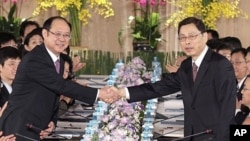Political rivals China and Taiwan will hold their sixth round of formal talks next week, to ease historic tensions. But negotiators will sit down in Taiwan with an awkwardly light agenda. That is because the easy problems have been covered and the outstanding issues are too hard to talk about yet.
In 2008, Taiwan and China agreed to meet formally, twice a year, for talks on economic and trade issues. But many of those have already found agreement. Taiwan says it is too early to tackle disputes about sovereignty, territory and military buildup, which have divided the two sides since the 1940's.
The talks set for December 20-22 in Taipei are no exception. Negotiators Chiang Pin-kung of Taiwan and Chen Yunlin from China will discuss a non-controversial deal on medical cooperation. Harder topics, from an investment guarantee deal to Taiwan's push for a higher international profile, will wait.
"We have done all the easy stuff in the previous 14 agreements," said Alexander Huang, a professor of Strategic Studies at Tamkang University in Taipei. "We cannot expect that all the future agreements are as easy as what we've done before. So it's very natural that we get into a pretty flat level. It's going to be pretty calm, pretty light and pretty long in terms of cross-Strait negotiations."
The light agenda next week points to what analysts call widening divides about how to settle more difficult issues. An investment guarantee pact, originally set for the talks, has been pushed back because of details on who would settle investor disputes.
A new round of tariff cuts - once expected for the late 2010 talks - is on hold, because it would cover imports that are more sensitive than the ones handled in June.
Agreements signed so far favor Taiwan. Now China wants to start talking about political unification. But Taiwan leaders say the time is not right to touch on that topic. That makes mainland China edgy because Taiwan's 2012 elections could restore power to a political party excludes talk of a unification of the two sides.
Beijing has claimed sovereignty over the self-ruled island since the 1940's.




